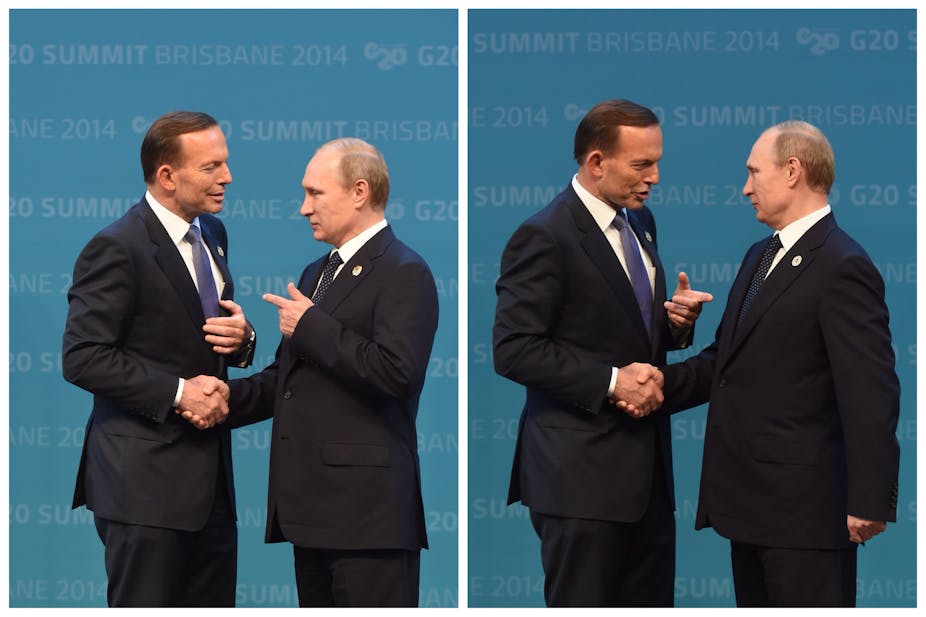When G20 leaders gathered for their “retreat” at Queensland’s Parliament House, they heard more about the Abbott government’s budgetary travails than they might have expected or wanted, even in a session on “the politics of economic reform”.
Tony Abbott didn’t hold back in sharing his pain.
After exhorting leaders to speak from the “heart”, he declared that trying to get the budget under control “has proven massively difficult”.
Deregulating university fees had run into the problem that “students never like to pay more”. And injecting a price signal into the health system had proved “very, very difficult”.
“We would like to see a $7 co-payment for people who are going to see the doctor. In most countries this is standard, that the doctor can charge a fee, but it is proving to be massively difficult to get this particular reform through the parliament,” Abbott said.
He added: “I don’t have any magic answers to the problems that we face”.
Opposition leader Bill Shorten later described his speech as “weird and graceless”. Shorten might have been remembering that in January, addressing the World Economic Forum in Davos on this year’s G20, Abbott had taken a direct swipe at the former Labor government’s high spending, saying that “governments can be like addicts in search of a fix”.
Abbott also gave the leaders his usual spiel about the government’s commitments, including repealing the carbon tax and stopping the boats, which “have, thank god, stopped”. That might have been better left for another time, given the presence of Indonesia’s new president Joko Widodo and the sensitivity of Indonesia on that issue.
Abbott’s horizon was narrow rather than broad in this setting amid the world’s most important leaders. But then the first day of the G20 has seen Abbott appear out of international sync.
According to the summary his office issued, the retreat discussion focused on the government’s priorities of jobs and growth. The leaders agreed that “we are all grappling with the inherent tension between policy and politics” and “we need to have a clear vision about where we want to go and then build consensus”.
They agreed they needed a “strong reform narrative” and “must seize the moment – get onto necessary reforms quickly”.
Priorities for reform included favouring “labour market outsiders over insiders”, the future over the present, particularly on infrastructure, and “what works and experience over ideology”.
But in the wider context Abbott has been mugged by the issue he wanted to marginalise – climate change.
It was a central theme of Barack Obama’s address at the University of Queensland. Not only did Obama talk up the importance of the agreement that he and Chinese president Xi Jinping reached this week on post-2020 action, and announce US$3 billion for the Green Climate Fund to help developing countries, he took clear aim at the Abbott government, declaring the Great Barrier Reef under threat and exhorting Australia to act so that it would be there for his future grandchildren to visit.
It’s as though two agendas are being run in Brisbane this weekend.
One is the growth and jobs agenda, to which everybody subscribes although UN Secretary General Ban Ki-moon sounded a warning that “the quality of growth is just as important as is the quantity”.
The other agenda includes climate and Ebola – items many of the leaders think important for this forum, but ones that the Australian government would prefer not get the headlines.
Late on Saturday, the G20 leaders issued the “Brisbane Statement on Ebola”. This said G20 members “are committed to do what is necessary to ensure the international effort can extinguish the outbreak and address its medium term economic and humanitarian costs”.
Abbott has previously won some plaudits for his performance on international issues. But in this setting, so far, he is looking less than impressive – excessively determined to do things his way and not willing enough to accommodate the preoccupations and priorities of others.
Listen to our G20 podcast here.

